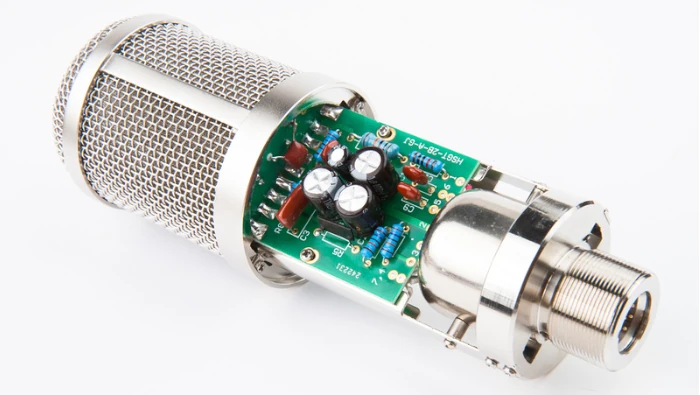When venturing into the world of home recording, the plethora of equipment choices can be overwhelming. Among the myriad of options, small microphones often catch the eye due to their affordability and compact size. But do these diminutive devices stand up to the demands of a home studio? It’s a common query for both novices and seasoned audio enthusiasts alike.
Many beginners ponder whether investing in a small microphone could be a stepping stone or a stumbling block for their recording endeavors. The allure is understandable: lower costs and a seemingly manageable entry point into the complex world of audio production. However, the effectiveness of small microphones in capturing high-quality sound is a subject ripe for exploration.
In this post, we delve deep into the capabilities of small microphones in a home studio setting. We’ll unravel myths, set realistic expectations, and provide insights based on firsthand experiences. Whether you’re setting up your first studio or looking to expand your recording arsenal, understanding the role of small microphones is crucial in making informed decisions that align with your artistic and technical needs. Join me as we explore whether these compact wonders are up to the task of delivering big results in small studio spaces.
My Journey with Microphones: From Video to Professional
My initial foray into the world of home recording began with a rather unconventional tool—a vintage video camera microphone. This relic from my earlier video equipment collection served not just as a means to capture visuals but as my first audio recorder. Dubbed my “dinosaur head” for its bulky size and peculiar appearance, this camera surprisingly offered a wide dynamic range, adept at capturing everything from the subtle nuances of voice to the vibrant strings of a guitar.
This setup, while unorthodox, was remarkably effective in my early days. The sound quality was acceptable for a beginner, balancing the raw edges of novice recording with the thrill of creating music. However, as my passion for audio production grew, so did my understanding and need for more refined equipment.
Transitioning from the video camera, I stepped up to a Shure SM58, a staple in the recording industry, particularly revered for its focus on vocal frequencies. This dynamic microphone was a revelation. It provided a robust sound profile that perfectly complemented vocal tracks, enhancing clarity and reducing unwanted noise—a stark contrast to my makeshift video camera setup.
The pinnacle of my microphone journey was incorporating the Neumann U87 Ai into my studio. This high-end condenser microphone, known for its exceptional clarity and detail, was a significant investment. Recording with the U87 Ai felt like a leap into professionalism, offering an unparalleled audio experience that captured every intricate detail of the sound.
Through this journey from basic, makeshift equipment to professional-grade microphones, I’ve learned that the right microphone not only captures sound but also captures the essence of the performance. Each step up brought a deeper appreciation for how much technology can elevate art. In this evolution, my home studio transformed from a place of experimentation into a sanctuary of sound, ready to meet the demands of any recording task with precision.
Analyzing the Capabilities of Small Microphones
Exploring the capabilities of small microphones reveals a world where size does impact performance, but not always to the detriment of the user’s goals. These microphones, often overlooked due to their minimalistic appearance and lower price points, have a specific role in the recording ecosystem that merits a closer look.
The heart of a microphone’s capability lies in its diaphragm. Small microphones typically feature a tiny diaphragm, which naturally limits their ability to capture sound with the fullness and depth offered by larger counterparts. This physical constraint impacts their frequency response and sensitivity, making them less ideal for capturing a wide range of sounds. For instance, they might excel in isolating speech for podcasts or voiceovers but struggle with the dynamic range needed for recording musical instruments or singing.
From personal experience, I’ve noticed that little microphones tend to exhibit certain limitations, particularly when recording in scenarios demanding high fidelity. They often “crack” under the pressure of intense sound levels or complex audio inputs, leading to a loss in audio quality. The sound may appear thinner or less vibrant, missing out on those crucial harmonic details that give recordings a live, authentic feel.
However, it’s not all setbacks with these compact devices. Their small size can be a significant advantage in certain contexts. For instance, in a tightly controlled environment like a home studio, where extraneous noise is minimized and the sound source is close to the mic, small microphones can perform adequately. They are particularly useful for basic track laying, where precision is less critical than getting ideas recorded quickly and efficiently.
Moreover, the technological advancements in microphone design have somewhat narrowed the gap in performance between small and large diaphragm microphones. Modern small microphones often incorporate sophisticated electronic compensations that boost their performance in capturing more detailed sound than one might expect.
In conclusion, while small microphones might not match the sonic depth of larger microphones, they offer specific advantages that can be suitable for certain types of recordings. Understanding these capabilities allows users to optimize their use in a home studio setting, aligning microphone choice with recording needs.
Economic Considerations for Budding Home Studios
Embarking on building a home studio brings with it not just creative excitement but also significant financial considerations. One of the primary cost-effective solutions many budding producers turn to is the use of small microphones. These microphones, often less intimidating in both size and price, serve as an economical entry point into the world of audio recording.
The affordability of small microphones can be a game-changer for those just starting out. For example, consider the minimal investment of a small condenser microphone—often found in computer headsets—which can be acquired for less than $3. This kind of cost efficiency enables beginners to experiment with recording techniques and sound production without the daunting expense of professional-grade equipment.
In our Home Studio Online Course, we recommend these small microphones as part of the minimum requirements for setting up a home studio. This approach isn’t just about cutting costs—it’s about learning and understanding the fundamentals of sound recording and production before making significant investments. It allows newbies to make mistakes, learn from them, and understand their needs without the pressure of having invested heavily in high-end gear.
However, it’s important to recognize that this is just a starting point. As skills and passion grow, so will the need for more sophisticated equipment. A small microphone might suffice for basic recordings and learning the ropes, but achieving higher quality sound will eventually require an upgrade to more advanced microphones and other studio components.
Therefore, when planning a budget for a home studio, consider both immediate needs and future upgrades. Start small, with what you can afford, and plan for gradual enhancements. This strategy ensures you are not compromising on the quality of your productions as your skills and budget increase over time.
In summary, while small microphones offer a cost-effective solution for those entering the field of audio production, they are part of a larger, more dynamic investment strategy tailored to personal growth and professional development in recording arts.
Recommendations for Microphone Selection in Various Recording Scenarios
Selecting the right microphone for your recording needs can significantly impact the quality and satisfaction of your final product. Whether you’re recording a podcast, capturing vocals for a song, or setting up for a full band session, understanding which microphone to use in various scenarios can make all the difference. Here are some practical recommendations to guide your choice:
1. Podcasts and Voiceovers:
– Small Condenser Microphones: Ideal for capturing clear speech, small condenser microphones are perfect for podcasts and voiceovers. They’re affordable and perform well in controlled studio environments where background noise is minimal. Look for models that offer a good balance between quality and price to ensure clear, comprehensible audio without breaking the bank.
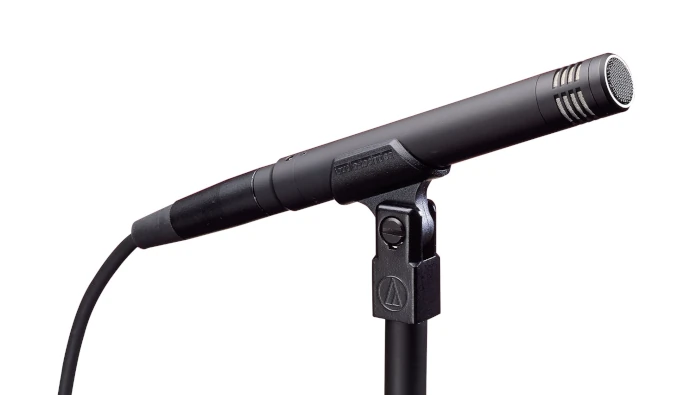
Small Condenser Microphones (often referred to as Small Diaphragm Condenser or SDC microphones) are known for their precision and ability to capture fine details, making them ideal for recording instruments with fast transients. Here are some notable examples:
- Neumann KM184: Renowned for its clear and natural sound, it’s often used for acoustic instruments, orchestras, and drum overheads.
- Shure SM81: A durable and versatile SDC microphone with a flat frequency response, suitable for a variety of recording applications.
- AKG C451 B: Known for its bright and detailed sound, it’s a popular choice for recording acoustic guitars, percussion, and overheads.
- Rode NT5: An affordable and high-quality pair of SDC microphones, great for stereo recording setups, particularly for pianos and acoustic instruments.
- Audio-Technica AT4051b: Offers a smooth, natural sound with excellent transient response, making it ideal for studio and live applications.
- sE Electronics sE8: Known for its natural and detailed sound, with a low noise floor, making it suitable for a variety of recording tasks.
- DPA 4011: A premium SDC microphone known for its exceptional accuracy and natural sound, often used in professional studios and live sound applications.
- Oktava MK-012: A versatile and affordable SDC microphone with interchangeable capsules for different polar patterns, making it a flexible choice for various recording needs.
- Beyerdynamic MC930: Known for its excellent detail and transparency, it’s often used for orchestral recordings and as overheads.
- Sennheiser e614: An affordable and reliable SDC microphone with a wide frequency response, ideal for cymbals, percussion, and acoustic instruments.
These microphones are excellent choices for capturing the intricate details and fast transients of various instruments, making them valuable tools in both professional and home recording studios.
2. Vocal Recordings:
– Dynamic Microphones: For vocal recordings, particularly in genres like rock or pop, a good dynamic microphone such as the Shure SM58 can be invaluable. These mics are designed to handle the power and nuances of vocal performances, providing warmth and reducing ambient noise.

Dynamic microphones are known for their durability, versatility, and ability to handle high sound pressure levels, making them ideal for live performances and recording louder sound sources. Here are some well-regarded dynamic microphones:
- Shure SM58: A classic vocal microphone known for its reliability, durability, and clarity in live performance settings.
- Shure SM57: Versatile and widely used for both instruments and vocals, particularly popular for miking snare drums and guitar amplifiers.
- Sennheiser MD 421: Known for its robust construction and clear, detailed sound, often used for drums, guitar amps, and vocals.
- Electro-Voice RE20: A favorite for broadcast and voice-over work, as well as for miking kick drums and bass instruments due to its smooth, flat response.
- Heil Sound PR40: Popular for broadcasting and podcasting, offering a full, rich sound with excellent low-end response.
- Audix i5: Similar to the SM57, it’s used for a wide range of instruments and is known for its durability and clear sound.
- Beyerdynamic M88 TG: Versatile with a broad frequency response, suitable for vocals, bass drums, and brass instruments.
- AKG D112 MkII: Known for its capability to handle high SPLs, making it ideal for kick drums and bass instruments.
- Sennheiser e935: A dynamic cardioid vocal microphone designed for clarity and projection in live sound applications.
- Telefunken M80: Offers a wide frequency response and high SPL handling, suitable for both live and studio vocal applications.
These dynamic microphones are renowned for their reliability and versatility, making them staples in both live and studio environments.
– Large Diaphragm Condensers: If you’re looking for more detail and a richer sound, consider a large diaphragm condenser microphone. These are particularly good for capturing the dynamic range of vocals in quieter, more acoustic genres.
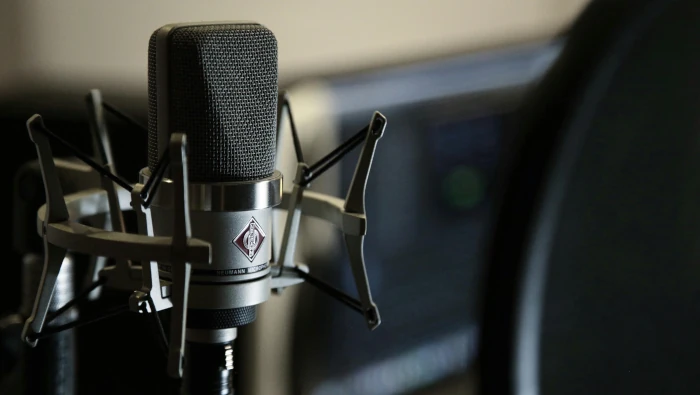
Large Diaphragm Condenser (LDC) microphones are popular in home recording studios due to their sensitivity and ability to capture a wide range of frequencies with detail. Here are some examples of well-regarded LDC microphones:
- Neumann U87: A classic and industry-standard microphone known for its versatility and high-quality sound.
- AKG C414: Another versatile microphone with multiple polar patterns, widely used in both studio and live settings.
- Audio-Technica AT4050: A versatile and reliable microphone with a detailed and natural sound.
- Rode NT1-A: Known for its extremely low self-noise and affordability, making it a popular choice for home studios.
- Shure KSM32: A durable and reliable microphone with a smooth, natural sound.
- sE Electronics sE2200: A well-regarded microphone known for its clarity and detail, suitable for various recording applications.
- Mojave Audio MA-200: A tube condenser microphone known for its warm and detailed sound, ideal for vocals and acoustic instruments.
- Blue Microphones Bluebird: Recognized for its distinctive design and clear, bright sound, making it a favorite for vocals and acoustic instruments.
These microphones are highly valued for their ability to capture the nuances of vocals and instruments, making them staples in many professional and home recording studios.
3. Instrumental Music:
– Small Diaphragm Condensers: When recording acoustic instruments like guitars or violins, small diaphragm condenser microphones are excellent. They are precise and capture the truest sounds of the instrument, making them ideal for classical or acoustic recordings.
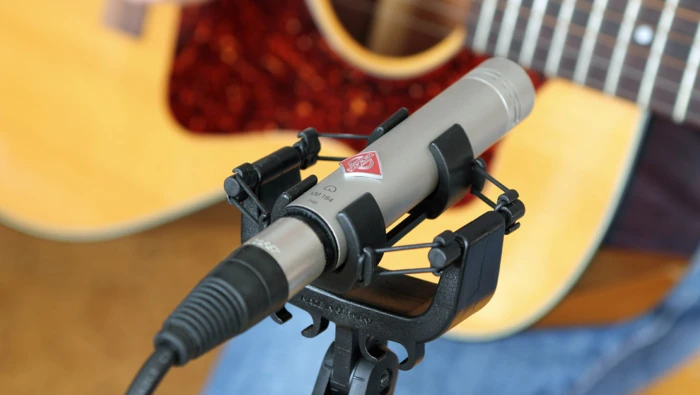
Small Diaphragm Condenser (SDC) microphones are prized for their accuracy and ability to capture fast transients, making them excellent for recording instruments like acoustic guitars, pianos, and percussion. Here are some examples of well-regarded SDC microphones:
- Neumann KM184: A highly respected SDC microphone known for its clarity and detailed sound, often used for acoustic instruments and overheads.
- Shure SM81: A versatile and reliable SDC microphone with a flat frequency response, suitable for a wide range of applications.
- AKG C451 B: Known for its bright and detailed sound, it is a popular choice for recording acoustic instruments and drum overheads.
- Rode NT5: An affordable and high-quality pair of SDC microphones, great for stereo recording setups.
- Audio-Technica AT4051b: Offers a smooth, natural sound with excellent transient response, suitable for studio and live applications.
- sE Electronics sE8: Known for its natural and detailed sound, with a low noise floor, making it ideal for a variety of recording tasks.
- DPA 4011: A premium SDC microphone known for its exceptional accuracy and natural sound, often used in professional studios and live sound applications.
- Oktava MK-012: A versatile and affordable SDC microphone with interchangeable capsules for different polar patterns.
These microphones are excellent choices for capturing the intricate details and fast transients of various instruments, making them valuable tools in both professional and home recording studios.
– Ribbon Microphones: For warmer tones and a vintage feel, particularly with guitar amps and brass instruments, ribbon microphones are a top choice. They are delicate but provide a rich, warm quality that’s hard to match with other types.
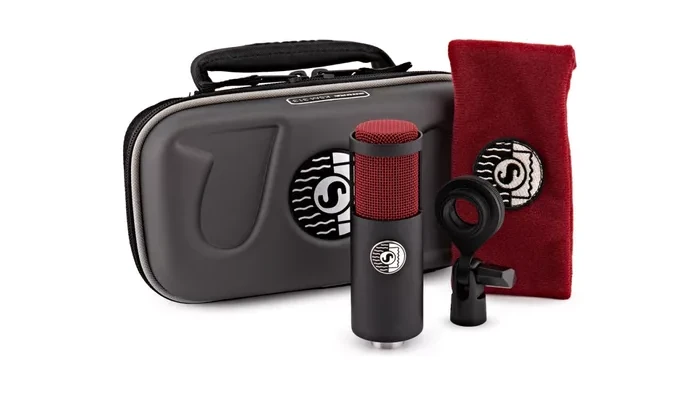
Ribbon microphones are known for their smooth, natural sound and ability to handle high sound pressure levels without distortion. They are often used for recording vocals, brass instruments, guitar amplifiers, and more. Here are some examples of well-regarded ribbon microphones:
- Royer R-121: A modern classic, known for its natural sound and ability to handle high SPL, making it ideal for electric guitar amps and brass instruments.
- AEA R84: Offers a warm and detailed sound, suitable for a wide range of recording applications including vocals, strings, and woodwinds.
- Beyerdynamic M 160: A compact and versatile ribbon microphone, known for its detailed sound and hypercardioid pattern, making it great for both studio and live applications.
- Royer SF-12: A stereo ribbon microphone that provides a natural and immersive sound, perfect for capturing room ambiance and orchestral recordings.
- Coles 4038: A classic ribbon microphone with a rich, smooth sound, widely used in professional studios for a variety of instruments and vocals.
- Cascade Fat Head: Known for its warm and vintage sound, this affordable ribbon microphone is great for recording guitar amps, drum overheads, and horns.
- Shure KSM313/NE: A dual-voice ribbon microphone with different frequency responses on each side, providing versatility for different recording applications.
- Aston Element: Combines ribbon technology with active electronics, offering a modern ribbon sound with added clarity and detail.
These ribbon microphones are valued for their unique tonal characteristics, providing a different sonic texture compared to condenser and dynamic microphones.
4. Full Band or Ensemble Recordings:
– A Combination of Microphone Types: Recording a full band or an ensemble involves a mix of all the above-mentioned microphone types. Dynamic microphones can handle the loudness of drums and bass, condensers can capture the subtleties of vocals and acoustic instruments, and ribbon microphones can add warmth to room sounds or brass sections.
When selecting microphones, consider not only the sound quality but also how each microphone will interact with your recording environment. Factors such as room acoustics, the presence of other instruments, and even the style of music should influence your decision.
In conclusion, while small microphones offer a practical start, diversifying your microphone arsenal as you grow allows for tailored, high-quality recordings in a variety of settings. Make your selections based on both your current budget and your artistic ambitions, ensuring that each purchase is a step towards achieving your ideal sound.
Conclusion: Balancing Needs and Expectations with Small Microphones
Choosing the right microphone for your home studio is a delicate balance between meeting your current recording needs and aligning with your budgetary constraints. Small microphones, while limited in some aspects, play a crucial role in this balancing act. They provide a feasible entry point for many budding artists and producers, offering a practical solution to begin their audio recording and production journey.
Throughout this post, we’ve explored various facets of small microphones—from their initial appeal due to low cost and simplicity, to the specific scenarios in which they can effectively be used. We’ve also discussed the inevitable limitations these microphones face when tasked with capturing more complex, nuanced audio. The journey from using small, basic microphones to integrating more sophisticated, higher-fidelity mics mirrors the progression of a recording artist or producer’s skills and needs.
As you venture further into the world of audio production, it’s important to reassess the tools you use. What suffices for a podcast or simple vocal recordings may not hold up when you’re ready to capture high-quality musical compositions or dynamic performances. The evolution of your equipment should match the growth of your ambitions and the expanding scope of your projects.
In conclusion, small microphones can indeed fulfill certain roles excellently and are especially suited for those just starting out or working with very limited budgets. However, as your skills improve and your needs become more sophisticated, investing in higher-quality microphones becomes not just beneficial but necessary for achieving professional-grade recordings. Remember, the quality of your recordings can only be as good as the quality of the sound captured by your microphones. Start simple, plan your upgrades, and continue learning to ensure that your home studio grows with you.

